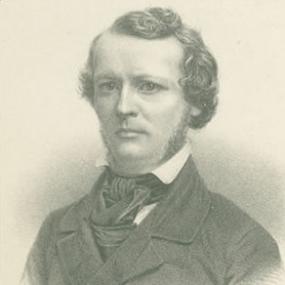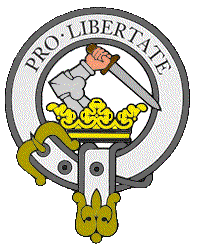 Though his works are largely forgotten today, William Ross Wallace’s poetry and verse were popular and well-respected in the middle of the nineteenth century. He was a close friend of Edgar Allan Poe, and Poe praised Wallace’s poetry. The well-known poet William Cullen Bryant also thought highly of Wallace’s work.
Though his works are largely forgotten today, William Ross Wallace’s poetry and verse were popular and well-respected in the middle of the nineteenth century. He was a close friend of Edgar Allan Poe, and Poe praised Wallace’s poetry. The well-known poet William Cullen Bryant also thought highly of Wallace’s work.
Wallace was born in Paris, Kentucky, in 1819. Between 1833 and 1835, he attended Hanover College (Indiana), and after graduation returned to his native Kentucky, settling in Lexington. While at law school and until 1839, he was the editor of ‘The Louisville Literary Register’. In 1841, he passed the bar, and established his practice in New York City, where he seems to have been more occupied with literature than with legal affairs. His poems were intensely patriotic, and he had an almost mythical reverence for the American Revolution and for George Washington. Numerous catalogs of American literature describe Wallace as a very popular poet, which suggests that his thoughts on the Revolution were in tune with the beliefs of many contemporary Americans.
In Wallace’s poetry of the 1850’s, he treated the Revolution in symbolic and grandiose terms. In ‘The Liberty Bell’ he
describes the ringing of the Liberty Bell, which had been rung on 04 July 1776, as a reverberation of a unanimous belief
among Americans that their time for freedom had arrived. He even goes so far as to say that the revolution was an ‘era sublime’. He clearly idealizes the Revolution in his work; he almost never mentions the bloody, distasteful aspects of war. In fact, he barely sees the Revolution as a war at all; he seems to think of it as a pure, blessed period in America’s history. In the ‘Last Words of Washington’, Wallace explicitly calls Washington a ‘savior’ of his country. Even though the scene Wallace
describes in this poem is Washington’s death, Wallace does not seem to describe him as an ordinary man bowing to death. Washington appears in this poem as a transcendent being that is being welcomed into an elite legion of timeless, scarcely mortal ‘heroes’. Wallace’s poems portray the American Revolution as an unblemished age when true greatness graced American soil.
After the outbreak of the Civil War, Wallace continued to write patriotic poetry in support of the Union. Some of these works were well-known and well-liked by
Union soldiers. As the war intensified, his melodious verses enjoyed an extraordinary popularity. They were sung by many regiments that marched out from
New York, for they were not only rhythmical and adaptable to musical setting, but were filled with a sentiment of patriotism, especially in those uncertain times, had a tremendous popular appeal in the North. Among these songs was the well known “Keep Step to the Music of the Union.” His “God of the Free” was intended to be a national anthem, but was not met with popular acceptance. Wallace also attempted fiction, but his one story “Albin, the Pirate” did not sell well, and has long been out of print. He was a popular lecturer and possessed extraordinary oratorical gifts. For nearly twenty years he was a regular contributor to the “New York Ledger,” “Godey’s Lady’s Book,” “Harpers’ Magazine” and “Harpers’ Weekly,” the “Celtic Monthly,” and other publications.
According to Edgar Allen Poe biographer Kenneth Silverman, in June 1842 Poe visited New York City and while there drank himself into an alcoholic amnesia. Poe explained that others had induced or forced him to drink. He said that William Ross Wallace would ‘insist upon the juleps, and I knew not what I was either doing or saying’. In the autumn of 1844 Poe completed his poem ‘The Raven’ and recited it to William at Stryker’s Bay Tavern, located on the Hudson River near where 96th Street now ends. William’s expressions of appreciation, it appears, were not thought by the poet to be adequate to the occasion. Poe, on his part, assured his listener that he had just heard the greatest poem in the language.
Though largely forgotten today, William Ross Wallace was a literary giant of his time. After all, it was William Ross Wallace who wrote:
‘But a mightier power and stronger, Man from his throne has hurled, For the hand that rocks the cradle, Is the hand that rules the world‘
Originally published in the Guardian, Vol 37 No. 1

Comments (1)
More of a question…Is it known if William Ross Wallace had a close friend named Alexander Clark? I have a book in my family that is signed by William Ross Wallace to “his dear and noble friend, Alexander Clark” in December of 1871. Thank you for taking time to read this.